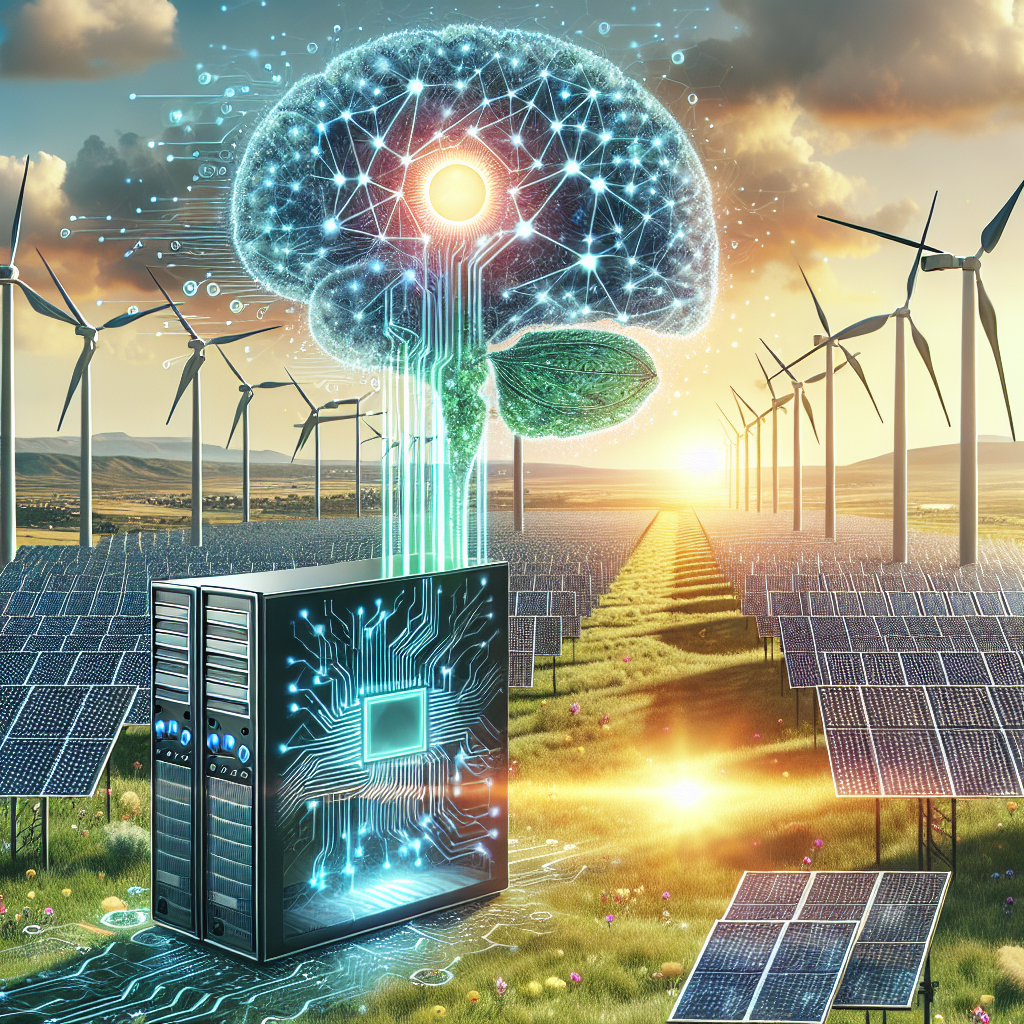As the world continues to grapple with the impacts of climate change, there is an urgent need to transition towards renewable sources of energy. Renewable energy sources such as solar, wind, and hydroelectric power offer a sustainable alternative to traditional fossil fuels. However, maximizing the potential of renewable energy sources requires innovative solutions that can address the challenges of intermittency and variability.
Artificial intelligence (AI) has emerged as a powerful tool for optimizing renewable energy systems and overcoming their inherent limitations. By leveraging AI algorithms and machine learning techniques, energy operators can improve the efficiency, reliability, and cost-effectiveness of renewable energy generation. In this article, we will explore how AI solutions can help maximize the potential of renewable energy sources and accelerate the transition towards a cleaner, more sustainable energy future.
1. Forecasting and Predictive Analytics
One of the key challenges in integrating renewable energy sources into the grid is their variability and unpredictability. Solar and wind energy generation depends on weather conditions, which can change rapidly and unpredictably. AI algorithms can analyze vast amounts of data from weather forecasts, historical energy production data, and other sources to predict future energy generation with high accuracy.
By using predictive analytics, energy operators can anticipate fluctuations in renewable energy generation and adjust their energy production and consumption accordingly. This helps to optimize energy storage, grid balancing, and demand response strategies, ensuring a reliable and stable energy supply.
2. Energy Management and Optimization
AI solutions can also optimize the operation of renewable energy systems to maximize energy production and minimize costs. By analyzing real-time data from sensors, meters, and other sources, AI algorithms can identify opportunities for efficiency improvements and recommend optimal operating parameters.
For example, AI-powered energy management systems can optimize the performance of solar panels by adjusting the tilt angle and orientation to maximize sunlight exposure. Similarly, AI algorithms can optimize the operation of wind turbines by adjusting the blade pitch and rotor speed based on wind conditions.
3. Grid Integration and Balancing
Integrating renewable energy sources into the existing grid infrastructure poses challenges in terms of grid stability and balancing. AI solutions can help to address these challenges by predicting energy demand and supply, optimizing grid operations, and managing energy flows in real-time.
AI algorithms can analyze grid data, such as voltage levels, frequency, and load patterns, to identify potential bottlenecks and vulnerabilities. By optimizing grid operations and coordinating the supply and demand of energy, AI solutions can help to ensure a reliable and resilient energy supply.
4. Asset Maintenance and Monitoring
AI solutions can also improve the maintenance and monitoring of renewable energy assets, such as solar panels, wind turbines, and hydroelectric plants. By analyzing sensor data, performance metrics, and historical maintenance records, AI algorithms can predict equipment failures, recommend preventive maintenance actions, and optimize asset performance.
By implementing predictive maintenance strategies, energy operators can reduce downtime, extend the lifespan of renewable energy assets, and minimize maintenance costs. AI-powered monitoring systems can also detect anomalies and inefficiencies in energy production, enabling operators to take corrective actions in real-time.
5. Energy Trading and Market Optimization
AI solutions can help energy operators to optimize their energy trading and market participation strategies. By analyzing market data, price signals, and regulatory requirements, AI algorithms can identify opportunities for energy trading, arbitrage, and revenue optimization.
AI-powered energy trading platforms can automatically execute trades, optimize bidding strategies, and manage risk exposure in dynamic energy markets. By leveraging AI solutions, energy operators can maximize their revenue streams and increase their competitiveness in the energy market.
FAQs:
Q: How can AI solutions help to reduce the cost of renewable energy?
A: AI solutions can optimize the operation and maintenance of renewable energy assets, minimize downtime, and improve energy efficiency, leading to cost savings. By optimizing energy production and storage, AI algorithms can also reduce the need for expensive backup power sources and grid infrastructure upgrades.
Q: Can AI solutions help to address the challenges of grid integration and stability?
A: Yes, AI solutions can help to predict energy demand and supply, optimize grid operations, and manage energy flows in real-time to ensure grid stability and reliability. By analyzing grid data and optimizing grid operations, AI algorithms can help to prevent blackouts, reduce grid congestion, and improve the overall performance of the grid.
Q: How can energy operators benefit from implementing AI solutions?
A: Energy operators can benefit from implementing AI solutions by improving the efficiency, reliability, and cost-effectiveness of renewable energy generation. By optimizing energy production, storage, and grid operations, AI solutions can help operators to maximize their revenue streams, reduce costs, and enhance their competitiveness in the energy market.
In conclusion, AI solutions offer a promising pathway towards maximizing the potential of renewable energy sources and accelerating the transition towards a cleaner, more sustainable energy future. By leveraging AI algorithms and machine learning techniques, energy operators can optimize the operation, maintenance, and integration of renewable energy systems, leading to increased efficiency, reliability, and cost-effectiveness. As the world continues to embrace renewable energy as a key component of the energy transition, AI solutions will play a crucial role in unlocking the full potential of renewable energy sources and shaping a more sustainable energy landscape.

